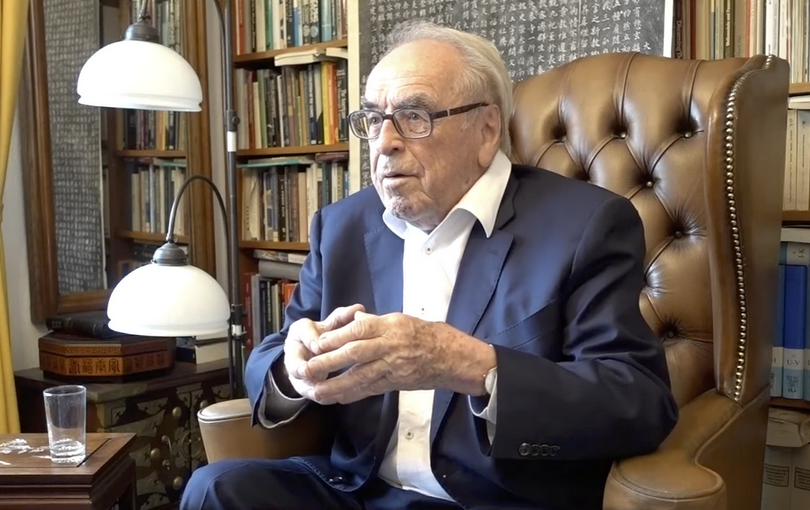The renowned global theologian, Professor Jürgen Moltmann, a German Reformed theologian, passed away in Tübingen on June 3, aged 98. He had a transformative impact on the Christian community’s understanding of Trinitarian theology. Also, he was a theologian who had profoundly influenced China.
Filmed by a Chinese Christian couple named Elizabeth Pan Leilei and Edward Wang Xin, The Way of Life is a documentary honoring the life and works of Jürgen Moltmann. The producers traveled to Germany and Taiwan, where Moltman served in his later years. The documentary, featuring both English and Chinese subtitles, presents his life, moving stories with his wife, as well as his theology, thoughts, and influence on the Chinese church. Elizabeth Pan Leilei said that in October 2019 the release of the document on the internet elicited considerable responses among European and American academic circles.
On June 5 of this year, Elizabeth Pan Leilei wrote to commemorate his passing, “The ‘broken-winged angel’ over Tübingen has been taken back to heaven. He will reunite with the hopeful people of this world in a new form of life in history’s future! With this film, I deeply commemorate one of the greatest Protestant theologians of the 20th century – Moltmann.”
Moltmann was the most influential Christian theologian of his generation, not only due to his prolific theological works (translated into about twenty languages) but also because of his tireless visits and lectures around the world. His theology continues to have an impact worldwide, including in China.
Theologian Miroslav Volf recalled in the documentary The Way of Life that in 2010, he participated in a large forum in Beijing with Moltmann, who was one of the main speakers. Most of the participants were neither theologians nor Christians. Moltmann delivered a speech at the conference, and all the important characteristics of his Christian theology were clearly intelligible. At the end of the speech, everyone stood up and applauded.
Professor Yang Huilin from Renmin University of China also shared in the documentary how and why Moltmann’s theology is so important in China. She said that it is a decentralized and open theology. Moltmann’s ecological theology has an original concept, which is also a political theology about how humans replicate injustice among people in nature. This attitude is valuable for the relationship between humans and nature. Such a great thinker can encourage us to be hopeful about the future. When thinking together, it is best to have a common background and experience. A traumatic event for Moltmann was the Second World War. The trauma, in turn, fosters independent thinking, even forced thinking. Yang Huilin quoted French philosopher Alain Badiou, “We are forced to think.”
Against this backdrop, there has been a long-standing cooperative relationship between Moltmann and the Institute of Sino-Christian Studies (ISCS) in Hong Kong. Such a relationship had long begun, even before the institute’s establishment. His first book, which was translated into Chinese in 1994, is The Crucified God. In the 1980s, the theology of hope was already widely known in Hong Kong. Professor Milton Wan Wai-yiu, a theologian from Hong Kong, recalled in the documentary that he studied German philosophy in the UK, so he was able to introduce Moltmann’s theology through writing and teaching in Hong Kong.
Daniel H. N. Yeung, the director of the Institute of Sino-Christian Studies, spoke in the documentary about his long and fruitful collaborative experience with Moltmann. He mentioned that Moltmann had studied Lao Tzu’s Tao Te Ching in recent years and tried to apply this resource to his theological thinking. On this topic, Moltmann talked about the proximity between the Tao Te Ching and the Bible: “I gave a lecture in Taiwan. I was guiding a doctoral student to study the understanding of nature in Tao Te Ching and the understanding of creation in the Bible. I saw that rulers must serve the people, and compassion and patience are the main virtues.” Moltmann’s cooperation with the ISCS lasted for more than 20 years. “He has provided us a lot of support.” With his help, a group of young talents emerged in the Chinese theological community.
Professor Zhang Xu from Renmin University of China mentioned in the documentary that in the second half of the 20th century, Moltmann’s theology also inspired liberation theology, popular theology, Korean theology, Southeast Asian theology, and Taiwanese theology.
- Translated by Charlie Li












